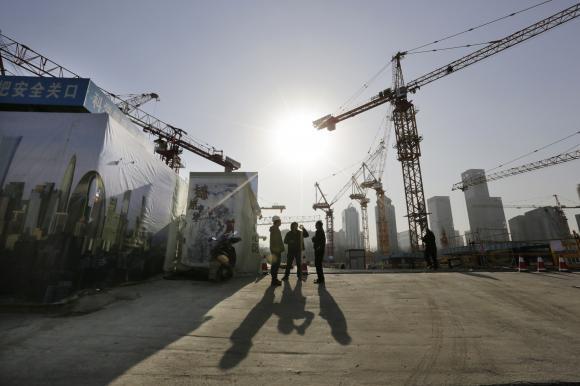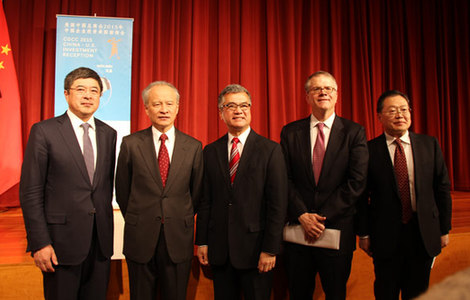Ecological civilization shapes nation's future
Updated: 2015-03-26 07:37
(China Daily)
|
||||||||
 |
|
Workers chat outside a construction site in Beijing's central business district, December 29, 2014. [Photo/Agencies] |
Top leaders vowed to accelerate the building of ecological civilization at a Tuesday meeting. The concept, which embodies the top leadership's vision in charting the country's new development path, has a far-reaching significance for China's economic and social development.
The pursuit of an ecological civilization, which covers economic, political, social and cultural aspects, is different from the West's industrialization. Unlike the Western countries which only began to address environmental problems after they became rich and transferred their highly polluting manufacturing to developing countries, China has to blaze a new trail in order to achieve sustainable development.
After more than three decades of economic success, environmental degradation and other adverse effects of the scale-based mode of growth have become an obstacle for economic and social development.
As the Chinese government has shifted from its long-held GDP-obsessed development to a comprehensive social and economic development evaluation system that balances GDP growth with its impact on the environment, the pursuit of an ecological civilization has naturally become the choice of the nation.
Building an ecological civilization, which underscores environmental conservation, quality-oriented intensive growth and harmony between man and nature, has been elevated to the height of the State will and national strategy.
Just as top leader Xi Jinping has pointed out, "the pursuit of harmony between humans and nature is about having both gold mountains and green mountains", establishing an ecological civilization will enable the country to have a sustainable mountain of gold and healthy green ones.
To balance development and nature, the country should give priority to controlling greenhouse gas emissions, tackling pollution and realizing a green, low-carbon economy. The growth of environmental protection industries and new energy industries will thus in turn become important boosters of China's economic growth.
As the world's second-largest economy that is willing to shoulder more international responsibilities, the country needs a global vision to quicken its steps in building an ecological civilization, so that efforts in this regard could be transferred into new comprehensive national power and new international competitiveness.
By following a path of "greening", China will also set an example for other developing countries and contribute to global sustainable development, and it can lead the way for the rest of the world to transform the traditional industrial civilization into an ecological civilization.

 Your city in the shape of tiny round planet
Your city in the shape of tiny round planet
 Families mourn victims of Airbus A320 crash
Families mourn victims of Airbus A320 crash
 38,000 Brazilian troops to safeguard 2016 Rio Olympics
38,000 Brazilian troops to safeguard 2016 Rio Olympics
 Chinese investors well received
Chinese investors well received
 Top 9 cities in China with highest cost of living
Top 9 cities in China with highest cost of living
 Would you take a challenge for charity?
Would you take a challenge for charity?
 Snow blankets Chicago after spring storm
Snow blankets Chicago after spring storm
 Haze descends on Paris
Haze descends on Paris
Most Viewed
Editor's Picks

|

|

|

|

|

|
Today's Top News
China, US work to clear legal hurdles
Cockpit voice recorder of crashed German plane found
US states reach out to China
Chinese investors well received
US states seek China ties at investment summit
Small US businesses using RMB for transactions: Survey
Iconic Chinese play hits America
Christie's has richest Asia Week
US Weekly

|

|








